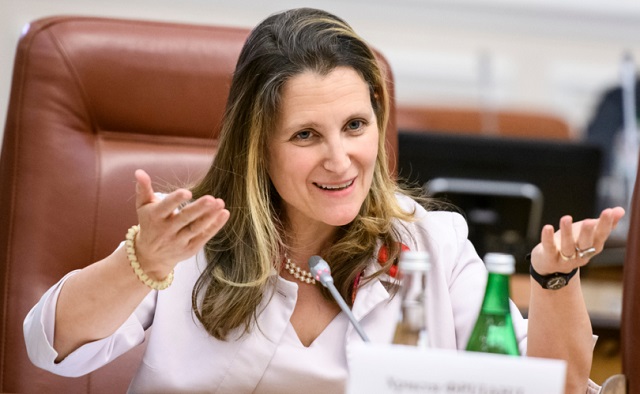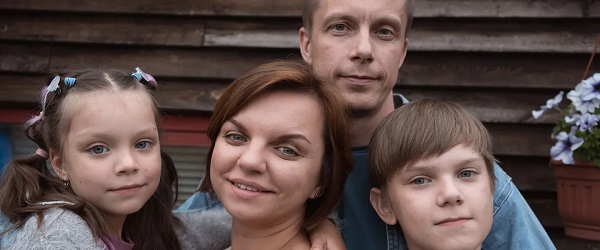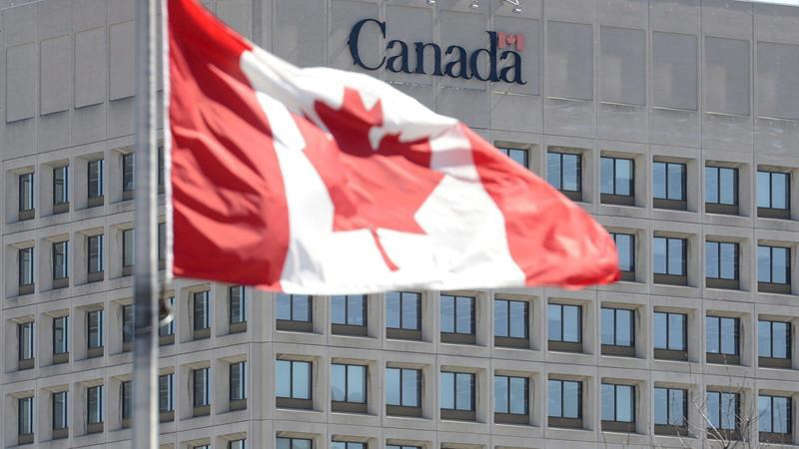Inflation
Chrystia Freeland refuses to answer how much Trudeau government has collected via carbon tax

From LifeSiteNews
Deputy Prime Minister and Finance Minister Chrystia Freeland continues to claim that the revenue from the carbon tax ‘goes back to Canadians’ despite data showing otherwise.
Canadian Deputy Prime Minister and Finance Minister Chrystia Freeland has refused to reveal how much Liberals have collected via the unpopular carbon tax, which is set to go up again on April 1.
During a March 21 session in the House of Commons, Conservative Member of Parliament (MP) Marty Morantz questioned Freeland regarding how much the Liberal government has taken in through the carbon tax.
“How much has your government collected in carbon taxes?” Morantz asked.
Freeland responded by dodging the question, stating, “[This is] also an opportunity for me to point out that Manitoba families will be getting $1,200 this year.”
“Again, minister, if I could just have the number [of] how much you’ve collected in carbon taxes,” Morantz pressed.
Freeland again refused to answer, instead claiming that the “key point” is that the “price on pollution” is “revenue neutral.”
As Morantz persisted in his question, Freeland alleged that the revenue from the carbon tax is “all money that goes back to Canadians.”
However, this statement has been proven untrue as the Parliamentary Budget Officer recently revealed that the government rebates are insufficient to cover the rising costs of fuel under Trudeau’s carbon tax, causing many to wonder where their money is actually going.
According to records published in December, the carbon tax cost Canadians nearly $200 million in paperwork since Prime Minister Justin Trudeau introduced the fuel charge in 2019.
Trudeau’s carbon tax, framed as a way to reduce carbon emissions, has cost Canadian households hundreds of dollars annually despite rebates when factoring in the indirect costs associated with the measure.
The costs are only expected to rise, as a recent report revealed that a carbon tax of more than $350 per tonne is needed to reach Trudeau’s net-zero goals by 2050.
Currently, Canadians living in provinces under the federal carbon pricing scheme pay $65 per tonne, but the Trudeau government has a goal of $170 per tonne by 2030.
Additionally, Trudeau has refused to pause the carbon tax hike scheduled for April 1, despite seven out of ten provincial premiers and 70 percent of Canadians pleading with him to halt his plan.
Meanwhile, Trudeau and his cabinet continue to attend lavish retreats, with a recent Liberal retreat costing taxpayers nearly $500,000.
During a media interview following the nearly $500,000 retreat, Trudeau told Canadians struggling with the high cost of living that times are also difficult for politicians.
“Yeah, people are facing tough times, and yes, everyone is finding it difficult right now. And as leaders, MPs, parliamentarians of all types, part of our job is to be there to take it, to support it as Canadians are worried and anxious, and put out those solutions,” he said.
“So yeah, it’s not an easy time to be a politician,” Trudeau lamented.
Business
Governments must work to improve Canadian living standards despite recent good news

From the Fraser Institute
By Jake Fuss and Grady Munro
For years, Canadians have experienced a decline in living standards. According to new data from Statistics Canada, living standards may finally be headed back in the right direction, but there’s still much work to be done.
The new numbers show that inflation-adjusted gross domestic product (GDP)—the final value of all goods and services produced in the economy—grew by 0.5 per cent during the first three months of 2025. During that same period, population growth slowed considerably to just 0.2 per cent. For perspective, the average quarterly population growth last year was three times this rate at 0.6 per cent. As a result, inflation-adjusted per-person GDP—a broad measure of individual living standards—grew by 0.4 per cent to reach $59,146 at the end of March 2025.
This is a good sign as it marks the first time living standards have improved for two consecutive quarters (per-person GDP grew 0.1 per cent to end 2024) since the first half of 2022, but we must temper our optimism. Economic growth remains relatively weak compared to historical numbers. And a per-person GDP of $59,146 is still 2.6 per cent below the mid-2022 level ($60,718). For comparison, per-person GDP in the United States after the first three months of 2025 is 4.9 per cent higher than in mid-2022.
Simply put, Canadian living standards remain well below levels they’ve been in past years and growth has fallen well behind growth south of the border, meaning governments across Canada must take steps to promote economic growth.
Recently, there has been a push in Canada to eliminate interprovincial trade barriers, which inhibit the free flow of goods and services between provinces and act as a drag on the economy. Several provinces have already taken steps towards this end, and the federal government has committed to eliminate all federally-imposed trade barriers by Canada Day. These efforts are long overdue, and should be joined by all governments across the country.
Governments should also get their finances in order and finally stop adding to the mountain of debt. In 2025/26, nine out of 10 provinces (except Saskatchewan) and the federal government plan to run budget deficits—meaning they will spend more money than they collect in revenues and thus must borrow additional funds. Consequently, government debt will continue to rise.
Rising government debt acts as a drag on the economy. Indeed, research suggests that when combined federal and provincial government debt exceeds the entire size of the economy (as it did in seven out of 10 provinces in 2022) additional debt offers little benefit to economic growth, and instead inhibits growth in the economy. As such, governments across the country must lower spending to balance their budgets and chip away at this mountain of debt.
Finally, governments should also pursue comprehensive tax reforms to lower the tax burden and make Canada more attractive to professionals, businessowners and entrepreneurs, while also improving the economic incentives to work, save and invest. Without meaningful reform, Canada’s tax system will continue to inhibit economic growth and, consequently, living standards.
New economic data suggest that Canadian living standards have improved in recent months, but we must temper our optimism. Governments across the country should pursue meaningful policy reforms to help grow the economy and improve prosperity.
Business
Bureaucracy balloons while less than 50 per cent of government performance targets are consistently met

The federal government added 98,986 employees since 2016, bringing the number of federal bureaucrats to 357,965, according to data from the Treasury Board of Canada Secretariat.
“The last thing Canadians need is a bloated government full of highly paid paper pushers,” said Franco Terrazzano, CTF Federal Director. “If politicians want to provide tax relief and start paying down the federal debt, they need to shrink government bureaucracy.”
The federal government reduced its payroll by 9,807 employees over the last year. However, the federal government still has 98,986 more employees than it did in 2016 – a 38 per cent increase.
The average annual compensation for full-time federal bureaucrats is $125,300, when pay, pension, and other perks are accounted for, according to the Parliamentary Budget Officer.
Taxpayers would save about $7 billion annually had the federal bureaucracy grew in line with population growth over the last 10 years.
There are seven federal departments and agencies that have more than doubled their number of employees since 2016, including:
- Infrastructure Canada (375 per cent)
- Women and Gender Equality Canada (334 per cent)
- RCMP External Review Committee (229 per cent)
- Elections Canada (173 per cent)
- Immigration and Refugee Board of Canada (158 per cent)
- Financial Consumer Agency of Canada (154 per cent)
- Impact Assessment Agency of Canada (127 per cent)
Employment and Social Development Canada added the greatest number of employees since 2016. The department added 16,842 employees since 2016 – a 75 per cent increase.
The Canada Revenue Agency added the second greatest number of employees over the decade. The CRA added 13,015 employees since 2016 – a 33 per cent increase.
“It’s good to see the bureaucracy shrinking a little bit, but it’s still too bloated and too expensive,” Terrazzano said.
It isn’t just the size of the federal bureaucracy that’s ballooning – the cost is too.
The PBO estimates the federal bureaucracy cost taxpayers $69.5 billion in 2023-24. In 2016-17, the cost of the bureaucracy was $40.2 billion. That’s an increase of 72.9 per cent.
The federal government handed out more than one million pay raises between 2020 and 2023, according to government records obtained by the CTF. The federal government also rubberstamped more than $1.5 billion in bonuses for bureaucrats since 2015.
Given the rash of bonuses and pay raises, on top of new hires, Canadians might wonder: how well are things running in Ottawa?
Less than 50 per cent of the government’s own performance targets are consistently met by federal departments within each year, according to a March 2023 report from the PBO.
“We are also committed to capping, not cutting, public service employment,” according to the Liberal Party’s 2025 election platform.
“Prime Minister Mark Carney’s promise to cap the bureaucracy doesn’t go nearly far enough and just entrenches the Trudeau government’s costly bureaucrat hiring spree,” Terrazzano said. “Taxpayers need politicians to cut the bloated bureaucracy and make pay and perks more affordable.”
-

 Crime15 hours ago
Crime15 hours agoHow Chinese State-Linked Networks Replaced the Medellín Model with Global Logistics and Political Protection
-

 Addictions16 hours ago
Addictions16 hours agoNew RCMP program steering opioid addicted towards treatment and recovery
-

 Aristotle Foundation17 hours ago
Aristotle Foundation17 hours agoWe need an immigration policy that will serve all Canadians
-

 Business14 hours ago
Business14 hours agoNatural gas pipeline ownership spreads across 36 First Nations in B.C.
-

 Courageous Discourse12 hours ago
Courageous Discourse12 hours agoHealthcare Blockbuster – RFK Jr removes all 17 members of CDC Vaccine Advisory Panel!
-

 Health8 hours ago
Health8 hours agoRFK Jr. purges CDC vaccine panel, citing decades of ‘skewed science’
-

 Censorship Industrial Complex11 hours ago
Censorship Industrial Complex11 hours agoAlberta senator wants to revive lapsed Trudeau internet censorship bill
-

 Crime18 hours ago
Crime18 hours agoLetter Shows Biden Administration Privately Warned B.C. on Fentanyl Threat Years Before Patel’s Public Bombshells



